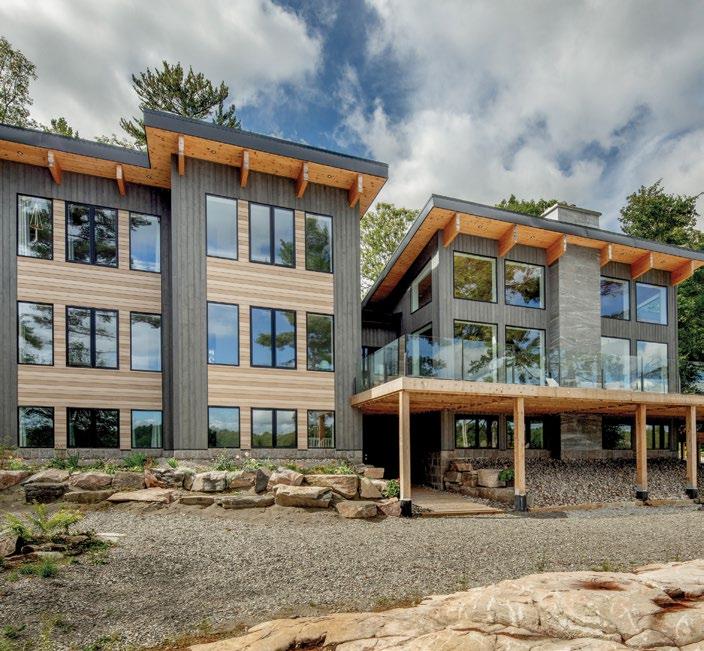
3 minute read
HEALTHCARE SOLUTIONS FOR THE FUTURE
Canada is making the future of our healthcare system a top priority. Look to some of B.C.’s right-sized communities for fresh approaches to delivering holistic healthcare that will support everyone from kids to seniors.
By Janet Gyenes
Advertisement
Staffing the Care Teams of the Future
Stories about lineups at drop-in clinics and the shortage of family physicians tell one story. Yet statistics from the Canadian Institute for Health Information (CIHI) show that the number of family doctors in Canada increased 24 per cent (47,337) in 2021, compared to a decade earlier, with B.C. having more per capita than the national average.
The difference comes down to fragmented data. Right now, there isn’t a single source of public health data bringing together the big picture of where resources, from doctors to dollars, are distributed. A Pan-Canadian Health Data Strategy is in the works by the federal government to analyze and improve current health-data collection and sharing methods to achieve better outcomes.
Everyone agrees, though, that career opportunities in healthcare, wellness and social assistance are expanding. WorkBC’s most recent Labour Market Outlook (LMO) projects just over one million job openings from 2021 to 2031. A projected 14 per cent of jobs will be in healthcare and social assistance, and other in-demand roles will include registered nurses, registered psychiatric nurses, nurse aides, orderlies and patient-service associates.
Already, B.C. is experimenting with different pay models for family doctors, and making it easier for internationally trained nurses to qualify to work here, by providing financial support for fees and expenses, and with information portals like HealthMatch BC.
Spotlight: Recruiting in Campbell River
The northern reaches of Vancouver Island have long been a draw for residents and visitors enamoured with nature and culture, but attracting healthcare professionals to permanently relocate to the region hasn’t been as easy. The Campbell River and North Island Labour Market Partnership Project is tackling that challenge. Members from the city of Campbell River, the Regional District of Mount Waddington and the Strathcona Regional District are studying changes to the policies and regulations that have put pressure on the region’s economic landscape.
“Access to healthcare is something that many people consider when choosing a place to live, so it also helps to attract and retain other employers and workers within a community,” says Rose Klukas, economic development manager at the City of Campbell River.
The project, which is slated to be completed in early 2024, has already received $250,000 in funding from provincial and federal governments through the Community and Employer Partnerships fund.
Facilities to House Future Innovation
B.C. is not only building a number of new hospitals in the Lower Mainland, but is also putting healthcare dollars into new facilities for currently underserved provincial regions. On Vancouver Island, the Cowichan District Hospital Replacement Project is building a $1.45-billion, 204-bed hospital that will include inpatient, outpatient and ambulatory services, operating rooms and expanded imaging and emergency capabilities.
Northern B.C. has at least three significant new facilities coming, including one in Dawson Creek that’s still in the planning stages. The Mills Memorial Hospital Redevelopment Project is investing $622 million in a Terrace-based centre for trauma, orthopedic, pathology, radiology, clinical and pharmacy services, as well as a training site for medical students. The $158-million Stuart Lake Hospital Redevelopment Project will serve Fort St. James and the surrounding First Nations communities with acute and long-term hospital beds; emergency, medical imaging, laboratory and supporting services; plus a primary-care clinic.
Spotlight: Community Collaboration in Summerland
An innovative team-based approach is taking place in Summerland to expand housing and build health services right into the blueprint. Parkdale Place Housing Society, which already runs two affordable residences for independent seniors, has proposed a new 81-unit residence with a primary healthcare centre on the main floor. The community’s doctors have endorsed the plan; all signed a letter of agreement to work together to set up the centre and co-locate to serve the community. Parkdale Place will also request funding from B.C. Housing. The portion of the commercial space set aside for the health centre will be stratified so ownership can be transferred to another non-profit or charitable organization, which will rent the space to doctors at market rates. Summerland City Council has also agreed to provide up to $1.5 million in support by waiving development costs and fees.







